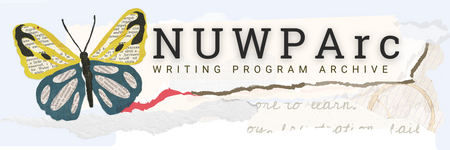Genres
Describes what a record is by type/category; "[genre] takes [action]"
Records are classified into genres based on presence of certain features
- Assessments [action: evaluates] - Materials used for evaluating students based on a set of criteria, including placement tests.
- Assignments [action: explains] - Instructions for completing writing-based or composition-oriented tasks.
- Blank Forms [action: collects] - Documents that hold space for entry of information.
- Checklists [action: provides] - Lists or to-do items formatted as action-oriented tasks to complete.
- Committee Descriptions [action: describes] - Summaries or overviews of what a position/role/group of positions or roles will entail.
- Concept Maps [action: illustrates/contains thoughts in form] - Visual representations of content used to enhance or demonstrate information in an alternative form to text.
- Correspondence [action: expresses/responds/requests]
- Course Descriptions [action: describes] - Summaries or overviews of what a course entails/will entail.
- Data [action: displays/characterizes] - Represents information gathered from surveys or forms; often presented visually.
- Ephemera [action: simply exists] - Miscellaneous materials not always with a clear origin, purpose, or function.
- Figures [action: depicts] - Diagrammatic representations of processes, procedures, or resources; structured visual forms of information.
- Floorplans [action: depicts] - Visual representations of real or imagined physical locations, e.g., buildings or offices.
- Flyers [action: advertises] - Public-facing communication sharing updates, news, and developments happening within the department or on campus; soliciting or advertising for participation and engagement in an event or opportunity.
- Guides [action: provides] - Documents that tell or show how to do or consider something.
- Handbooks [action: informs] - A collection of procedures or training approaches.
- Job Descriptions [action: describes] - Documents that advertise for or describe open employment or role opportunities.
- Learning Goals [action: articulates] - Objectives outlined within situational, time-oriented contexts that follows a predetermined schedule, curriculum, or process.
- Meeting Minutes [action: summarizes/captures] - Notes containing information regarding happenings and topics addressed or explored during a department meeting.
- Memos [action: shares/announces/requests] - Document providing information about developments or occasions and often says MEMO in the document.
- Outlines [action: organizes] - Structured example of an end-product or goal.
- Presentations [action: shares] - Information designed for sharing with various audiences using text, graphical elements, and/or images; PowerPoint or similar digital applications are used to display information on topics of interest.
- Procedures [action: (re)enforces/articulates] - Departmental or campus-wide rules; may be accompanied by expressions of punitive action or reinforcement.
- Program Evaluations [action: reviews/recommends]
- Proposals [action: appeals/generates] - Documents suggesting implementation of a plan or to (re)design a course or procedure; assert an intention to pursue a specific initiative or action/set of actions.
- Publications [action: considers/argues/articulates/applies] - Writing artifacts that were published by someone in the department/for departmental use and distribution.
- Recommendations [action: offers/suggests]
- Reports [action: informs/provides] - Findings communicated with stakeholders within or beyond the department, often following an evaluation; includes accreditation.
- Rubrics [action: evaluates] - Documents that include scores or numeric values assigned to certain traits or features of a work; may be tabular.
- Statements [action: discusses/opines] - Documents oriented toward discussing the impact or significance of a departmental project, roles, or administrative positions; opinionated, in support of taking action towards or augmenting a stance.
- Surveys [action: collects] - Documents soliciting or requesting feedback which apply metrics; differentiated from forms which collect only descriptive information.
- Syllabi [action: expresses/enacts] - Documents containing some combination of articulated course content and goals, often framed relative to program goals and outcomes within the larger situational context of university objectives or requirements; may contain assignment sheets and rubrics as part of document
- Templates [action: provides] - Examples of structured content which may be adapted or revised for situated use.
- Workshops [action: shares/engages] - Materials designed to engage participants in sharing and gaining knowledge in specific topic or content areas.
Subjects and Keywords
as of April 2023
Describes what a record is about; "[genre] shows us something about [subject/keyword]"
- Course Design
- Curriculum
- Enrollment
- First-Year Writing
- Graduate Students
- Grammar
- Labor
- Language
- Learning Environment
- Measurement
- Methods
- Middler-Year Writing
- Outcomes
- Pedagogy
- Peer Review
- Performance
- Placement
- Policy
- Professional Development
- Proficiency
- Program Administration
- Program Development
- Program Reform
- Programming
- Reflection
- Research
- Retention
- Technology
- Text Use
- Writing Classrooms
- Writing Center
- Writing in the Disciplines
- Writing Practice
- Writing Process
- Writing Program
